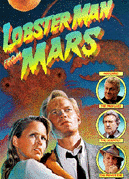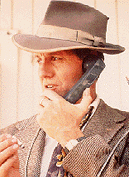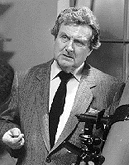 |

|
|
“I was quite amazed that this $50,000 film ended up with
a budget of $1,000,000 and even made a profit!”
|
 |
Part One of Two.
Recently, Ziggy was able to chat with Stanley Sheff, director of
Lobster Man From Mars. Prior to bringing his tribute to the golden
age of drive-in science fiction to the screen, Mr. Sheff spent time
working with the great Orson Welles, who actually inspired the title for
Sheff's film. However, it's best to let him tell the story in his own
words, so without further fanfare...
|
| Ziggy: |
What exactly was the genesis of
Lobster Man From Mars? How did it all come about?
|
| Stanley Sheff: |
I was offered the sum of $50,000 to do a feature film. The
challenge was to create a story that could be made on that budget. My
writing partner (the late Bob Greenberg) and I came up with the idea of a
letting the audience know in advance it was going to see a $50,000 film.
We decided on the "film-within-a-film" concept, which was the cheap film
by Stevie Horowitz, Lobster Man From Mars. The $50,000 never
materialized, but we did end up with a very funny script -- written in two
weeks.
|
| Ziggy: |
You've said that the movie took "two weeks to write and ten
years to make". Can you expand on that?
|
| Stanley Sheff: |
We wrote the script in two weeks, but the promised $50,000
never materialized. After many years of unsuccesdful money raising
efforts, a friend (former head of Warner Bros. Animation Steve Greene) had
a meeting with a producer looking for a low budget film. He called me and
asked if I could come up with a $350,000 budget. No problem, I just took
the $50,000 budget, poped it into the computer, multiplied by seven and
bang - $350,000 movie!
|
| Ziggy: |
Once you finally were able to get started with making
Lobster Man, what did you feel was the biggest challenge you faced
with the production?
|
| Stanley Sheff: |
The production went very smoothly; after all, I had ten
years to plan it! By the time we went into production, the budget was up
to $800,000. In addition, we cut a promo after the shoot and based on
that, were able to sell the advance video and theatrical rights for $1.4
million. We had a nice profit even before post-production. I was then able
to go back for another week of shooting to get all the shots we had to
skip. I was quite amazed that this $50,000 film ended up with a budget of
$1,000,000 and even made a profit! What was even more of a surprise was
that it had its premiere at The Sundance Film Festival.
|
| Ziggy: |
Lobster Man From Mars contains many, many references
to classic "drive-in" type science fiction movie cliches, etc. Were there
any specific references you wanted to be sure to get into the film, and do
you have a favorite?
|
|
Stanley Sheff: |
Teenagers From Outer Space featured a swell ray gun
that turned people into skeletons. Also, "Missle to the Moon" had the same
effect whenever a person ventured into the bright sunlight on the moon. We
decided to use the ray gun effect for the lobster man. My favorite is the
head in the jar, "Brainex", a tribute to the head in the jar from
Invaders From Mars. [Ziggy's Note: Stanley Sheff himself
provided the voice of "Brainex" in Lobster Man From
Mars.]
|
 |
Ziggy: |
With the decidedly drive-in sci-fi feel that you gave to
the "movie within the movie" for Lobster Man, what made you decide
to add the private eye/film noir element? And once that decision was made,
how did Tommy Sledge become involved?
|
| Stanley Sheff: |
I was working on a comedy special for Showtime and Tommy
Sledge was one of the comedians. He was so funny I thought he had to be in
the picture. I asked him and he said "yes!"
|
| Ziggy: |
Did you find it easy to add Tommy Sledge's material into
the screenplay, or was that something of a challenge?
|
| Stanley Sheff: |
It was easy, since the film within-a-film was so loosely
structured to begin with. Tommy's dialogue is all his, and is
brilliant.
|
| Ziggy: |
With all of the modern effects techniques so readily
available, was it easier or more difficult to make a film consistent with
the old drive-in standards (the visible lines holding up the bats,
etc.)?
|
| Stanley Sheff: |
It is actually quite a trick to find the balance between
effects that look either too good, or too stupid. By the way, the bat
strings were not planned. We tried to hide them, but they showed up
anyway. I liked the way it looked so we kept it.
|
| Ziggy: |
Of those "cheap effects" (and I use the term with respect,
of course), do you have a favorite?
|
| Stanley Sheff: |
The flying saucer flying over the car on the lonely
road. This was not an optical effect, but done "in camera" using a
foreground miniature, just like they did it in the silent film days.
Another is the energy beam that appears under the flying saucer when it
takes off from Mars. This is the actual "Star Trek" transporter optical
element. Howard Anderson Co. did our optical effects, and also did many
for the original "Star Trek" TV series. They had it lying around, and I
was allowed to use it. First (and last) time it had been seen since the TV
show! Listen carefully and you'll hear a bit of the Enterprise's
warp drive engine sounds during that scene. I also used the "Star Trek"
"star field" for the main title sequence.
|
| Ziggy: |
What would you say is your favorite behind-the-scenes
moment from Lobster Man From Mars?
|
 |
Stanley Sheff: |
Working with Patrick MacNee. We usually were able to do
scenes in one or two takes, but there is a long scene in the Professor's
Lab that took 37 takes. Nobody could get through it without laughing. If
the cast made it without laughing, the crew would laugh, and if the crew
was quiet, the cast would laugh. It has the line "If you were a Lobster
Man, would you enter a haunted house surrounded by artillery?". Every day
of that shoot was a party. We all had a great time.
|
| Ziggy: |
What about in front of the camera?
|
| Stanley Sheff: |
I am fond the the haunted house sequence. Billy Barty was a
lot of fun as Mr. Throckmorton. Vincent Price had agreed to do that part,
but was on a cruise when we shot it. Billy agreed to do a night shoot and
never complained. A true professional. You will note that Mr.
Throckmorton's bushy eyebrows were his idea, and looked great!
|
| Ziggy: |
Was that really the end of Mombo? (I love that
line!)
|
| Stanley Sheff: |
Unless I buy another cheap gorilla suit and a space helmet
from the Hollywood Toy Store, it is... Mombo's helmet opening and the fake
guts flying out was one of those shots I did during the extra week of
shooting. We ran out of daylight shooting it the first time. The footage
was too dark, but I would have used it if I had to. Here's how we did the
effect. The helmet was nailed to a board. The board was on a 45 degree
angle, with the camera at the same angle so it would look level. We then
poured the guts into the helmet. On screen it looks like they shoot out
with great force! My thanks to Tony Doublin for the great effects
work.
|
| Ziggy: |
Is there anything you would like to have done differently
on the film, given the chance?
|
| Stanley Sheff: |
The ending with Stevie in the office. It was not was
what originally written, and is the only thing I would like to do over.
The original ending was a series of false endings -- climaxing with a
sequence, "Lobster Man on Broadway". The fake endings would have bookended
the trick "scene missing" opening. We cut the endings to keep the budget
under control. As a protest, I copied the last shot from Orson Welles'
The Magnificent Ambersons, which was not Orson's ending. It's the
shot where the actors walk out of a doorway and around the camera on
either side.
|
|
Stanley Sheff had more to say. Click
here to go on to Part Two of the interview to learn more about
"Lobster Man From Mars", what he learned working the the great Orson
Welles, his views on drive-in movies, and
more! |

